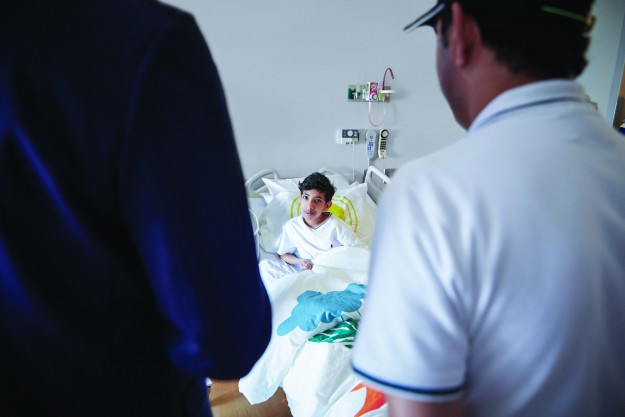Parents often say they would do anything possible to protect the health and happiness of their children. That was certainly the case with the Aldhanhani family from the United Arab Emirates.
The Aldhanhanis’ son Khalifa was born with a serious blood disorder known as beta thalassemia, which can enlarge the spleen, liver and heart, and can cause bones to become thin, brittle and deformed.
Khalifa underwent his first bone marrow transplant in the United Kingdom at age 7, but developed complications four years later. The father, Ali, knew his son needed more responsive treatment, right away. People with beta thalassemia require frequent blood transfusions and can suffer heart failure as early as their teens or early 20s.
Ali scoured the internet for a new doctor and read about pediatric oncologist Kenneth R. Cooke, M.D., at the Johns Hopkins Kimmel Cancer Center.
From there, a lot of positive signs lined up. The Emirati government approved the Aldhanhanis’ request to seek the medical care Khalifa needed, even if that meant going abroad.
Ali sent Khalifa’s records to us, and we were able to coordinate an appointment with Dr. Cooke within a short period of time. As soon as they could, the family traveled to Baltimore.
Prior to their trip, a family friend in the UAE who’d been treated at Johns Hopkins connected the Aldhanhanis with one of our international care coordinators. Our care coordinators do an excellent job of blending our patients’ medical needs, individual preferences and cultural, linguistic and religious expectations to create a tailored patient- and family-centered experience.
During Khalifa’s stay at The Johns Hopkins Hospital, everyone respected the Aldhanhanis’ Islamic religion and culture. The team made sure the family had the space and time for uninterrupted prayers, and they put a “Knock First” sign on Khalifa’s door to protect his mother’s privacy as she stayed in her son’s room during his hospitalization.
The clinical care also went off seamlessly. Dr. Cooke expertly diagnosed the trouble with Khalifa’s initial transplant. Khalifa had developed therapy-related myelodysplastic syndrome, which is life-threatening and required a second transplant with an alternative donor.
We're happy to report that the second procedure was a success, and Khalifa, now 13, is thriving.
A version of this story first appeared in Leader, a magazine that connects the leaders of the world with Johns Hopkins Medicine, a global leader in medicine.
